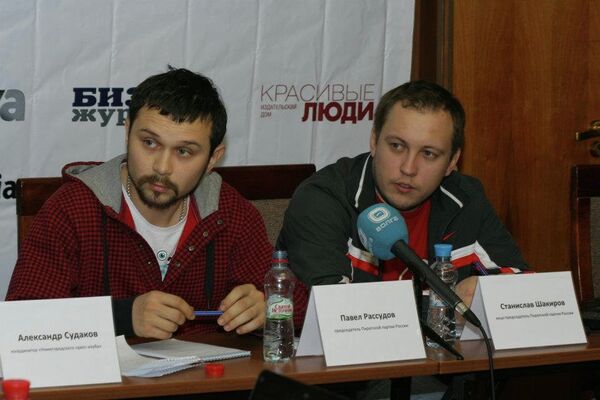A bald, muscular, tattooed, earring-sporting ex-navy officer represented the Pirate Party of Russia at Kaliningrad’s mayoral elections last month.
Dmitry Yevsyutkin only scored 2.7 percent of the ballot, or some 2,000 actual votes, in Russia’s western exclave – but the unregistered party’s leaders said it was good score for a first attempt.
“Some voters said, we don’t know who Yevsyutkin is, we just came to support the things he stands for,” deputy party head Stanislav Shakirov told RIA Novosti.
Born to campaign against intellectual property rights, the Pirate Party is putting the copyright crusade on the backburner to focus on offline issues such as transparent governance, censorship and even street cleaning.
They are not the first pirate party worldwide to adjust their sights like this, but the move could have far-reaching effects in Russia’s turbulent political landscape.
Looking nothing like politicians while offering a relevant agenda gives the pirates a good shot of winning support from young educated urbanites – the driving force of the recent street protests – who remain distrustful of most opposition politicians.
Now all they have to do is convince people they are “not just about torrents,” the pirates said in an interview.
'People's Party'
The Pirate Party of Russia challenged the government just last week, when they launched a service to provide access to webpages blacklisted by the government as harmful to minors – a new practice that, pirates say, enables censorship.
That was not their dig at the powers-that-be: last year, Ruleaks.net, a Russian offshoot of Wikileaks supported by the party, published photos of “Putin's dacha,” a posh mansion alleged to belong to then-Prime Minister Vladimir Putin, whose representatives denied the allegations.
“We didn't get hit on the head for that, but they tried to scare us a bit by having us tailed,” Shakirov said, smiling like he did not quite believe people could get tailed in the real world.
The pirates say they are also trying to work with the government, mostly by inundating them with letters and complaints, but only the Communications Ministry has showed any sign of receptiveness so far.
The Pirate Party stands for better control of the country's bloated and self-serving bureaucracy and more public involvement in governance matters, its leaders said.
It refuses to subscribe to any clear-cut ideology, instead focusing on being the “people's party” and offering “real action,” especially – but not exclusively – on transparency and public control, they said.
Neither Rassudov, 29, a psychologist, nor Shakirov, 25, a computer programmer, look or behave like politicians, and both keep a low public profile. The party’s approach to management is markedly laidback, complete with “Caramba!” exclamations in their news items.
This is in sharp contrast to leadership of the mass anti-governmental rallies in Moscow. This protest movement is rooted in Russia's blossoming non-political grassroots activism, but is largely led by professional politicians who are often accused by rally-goers and the Kremlin alike of self-indulgent PR, overt ambitiousness and the lack of any practical agenda.
The easing of party legislation, a Kremlin concession to protesters, brought about dozens of new political parties this year, but none have a strong brand like the pirates, who are preparing to apply for registration with the Justice Ministry.
Their vagueness on strategy matters may also work to their advantage, given that ideologies carry little weight in modern politics, Sergei Mikheyev of the Center for Political Assessment, a think-tank, told RIA Novosti earlier this year.
Niche groups focusing on practical issues such as the Pirate Party, the Pensioners' Party or Russia’s powerful motorist unions stand a better chance of scoring with the skeptical voters than parties touting battered “regular” ideologies, said independent political analyst Artemy Pushkarev.
Campaign Through Videogames
The party – one of 28 proud members of the Pirate Parties International – dates back to 2006, and was at first aiming to fight copyright laws, like its direct inspiration, Sweden's Piratpartiet.
But it has undergone numerous revamps since. Its founder Ilya Kravtsov is actually living in Somaliland now, though he is running educational programs and a business there, not aligning with old-school sea pirates.
The current leadership overcame a “conservative pirate lobby” to add offline items such as transparency and participatory democracy to its “to-do” list at a seminal convection this year, Rassudov said.
“It's how we feel about things,” Shakirov said.
“We're the first post-Soviet generation, the first free and non-brainwashed one...and we think that the authorities are here to serve the people, not the other way round,” he said.
The party subsists mostly on its supporters' enthusiasm and fees from its 500 card-carrying members (median age 28) – 1,000 rubles ($30) per capita a year. But they are full of plans, the first short-term goal being the campaign for the Moscow City Duma vote next year.
Campaign strategy is up in the air, but it could include issues far removed from copyright or free Wi-Fi, such as street cleaning and solving traffic jams, just because the party has some ideas on each count, Rassudov and Shakirov said.
The pirates also plan to improve brand recognition, convincing the public that they are not just about downloading films off the web.
One idea is to develop a crowdsourced browser and smartphone game to educate the public about their principles – while hopefully “raising some dough too,” Shakirov said.
“It took the Germans two years to understand that their pirates are not about robbery,” Shakirov said. He gave no timeframe for their campaign.
“I know we'll come to loggerheads with them eventually,” Shakirov – who is himself active in pestering bureaucrats in his district in western Moscow – said of Russian officialdom.
“But we're building up strength, so we're ready when the time comes,” he said.
(RIA Novosti reporter Angelika Wohlmuth contributed to this article.)


